“Over the city lies the sweet, rotting odor of yesterday’s unrecollected sins.” – Hilary Mantel, Wolf Hall
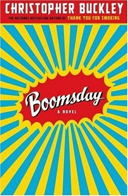 |
Boomsday, by Christopher Buckley I read Christopher Buckley’s editorials and essays with interest, but cannot endorse his fiction. Since I found my copy of Boomsday on the remainder shelf at Barnes & Noble, I suspect other readers have the same problem. Buckley’s characters are paper-thin stereotypes, inserted into the narrative merely to push or reinforce political messages (Social Security is bad and must be dismantled, in this case). I love watching The Office on TV, but I would not have the patience to read a novelized version of it. Maybe Boomsday could be made into a TV sitcom . . . I might watch an episode or two. But as a novel, it’s 95% fluff and 100% owner-class propaganda, and, to me at least, pretty much unreadable. |
 |
Fire, by Sebastian Junger A collection of early magazine pieces by Sebastian Junger. Junger is not exactly a war correspondent, he’s more of an action correspondent — when something interesting and physical is happening somewhere, whether it be hotline crews fighting western wildfires or UN war crimes investigators trying to identify the Serbs who killed their Muslim neighbors, Junger is not only compelled to be there but to become a participant himself, and the immediacy and clarity of his writing make you want to be there too. |
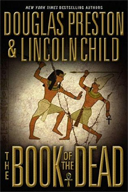 |
The Book of the Dead, by Douglas Preston and Lincoln Child I enjoyed Douglas Preston’s recent best-selling sci-fi thriller, Impact, but did not much like this one, a bit of airport trash he co-wrote with Lincoln Child. It’s not as bad as Ted Bell’s Spy, but it’s pretty bad all the same. My biggest problem? The Book of the Dead is one of a series of novels, with a cast of characters introduced (and presumably more fully developed) in earlier novels. Unfortunately, though I think the authors intended it to be, it is anything but a stand-alone novel. Odd and peripheral characters are constantly being introduced with no explanation of what may have gone before — two separate female characters had apparently been attacked and almost murdered in previous novels; another seems to a scientific and philosophical experiment, a 100-year-old savant in the body of a woman in her 20s, with the social skills and worldly experience of a home-schooled 12-year-old — and you never quite grasp who these people are or why they’re important. The main characters, two brothers, are well explained, though improbable — one is an evil genius, the other a good genius, each gifted with essentially superhuman powers. And there’s a female police captain, who is always referred to by her title, which is Captain of Homicide — a most un-American kind of title, although she’s NYPD. In parts of the book it is all too clear that two writers are at work, often at cross purposes. In a climactic scene, the evil brother retreats to his volcanic island fortress, and suspecting that the 100-year-old 20-year-old woman has tracked him down and is even now climbing the volcano to reach his fortress, barricades himself deep within, surrounded by 3-foot-thick stone walls — yet he not only hears her knock on the door, he says “who’s there?” in response. The plot, the cliffhangers, the main characters (and some of the peripheral ones) all have this in common: they are impossible, utterly removed from life as we know it. And yet this is not a comic book, or a fantasy like Harry Potter — it’s supposed to be a thriller, based in modern life and experience, and thus remotely possible. Well, it ain’t, and I didn’t like it. |
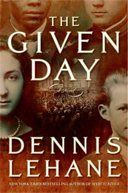 |
The Given Day, by Dennis Lehane This is a grand read, a sweeping novel covering a fascinating time in American history. Set primarily in Boston near the end of WWI, we experience (through a small but fascinating cast of well-placed characters) the start of Babe Ruth’s meteoric career, the Jim Crow era in northern and midwestern American cities, black inner-city crime, the great flu epidemic of 1918, the rise of the American labor movement, the beginnings of what eventually became the FBI, and the disastrous Boston police strike. The main characters — Babe Ruth himself, a young black man on the run, a Boston cop and his Irish lover — are well drawn and fully fleshed out, perfect foils for Lehane’s grand history lesson. I was initially disappointed that the narrative stopped short of the Tulsa race riots, a suppressed episode in American history — but perhaps Lehane knew what he was doing in not insulting educated readers by going in predictable directions. After some of the airport thriller crap I’ve been reading, full of impossible situations and characters with bullshit superhero powers, The Given Day was a welcome dose of real life, actual history, and damn good writing. |
 |
Solar, by Ian McEwan An engaging comic novel about a Nobel prizewinner, his glory days long behind him, who through a series of malign accidents gets a chance to climb back on top again with a breakthrough in photosynthesis. He’s undone by his inability to control his personal appetites and his childish tendency to put off addressing problems when they first appear. Solar reads like a screenplay, a bit too glib and predictable, entertaining but ultimately unmemorable. McEwan, as always, writes brilliantly, but I don’t think he had his heart in this one. |
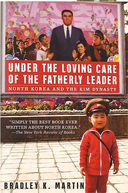 |
Under the Loving Care of the Fatherly Leader: North Korea and the Kim Dynasty, by Bradley K. Martin Unless you, like me, are concerned about renewed war on the Korean Peninsula and curious about the ability of the ruling Kim dynasty to stay in power while they imprison, starve, and kill their people, you will find this an intimidating, even forbidding read. At 849 pages (with acknowledgments and index) it rivals William Shirer’s Rise and Fall of the Third Reich for buik. Shirer, at least, had some facts to work with. The Nazis kept voluminous records. It was work, but not impossible work, for Shirer to learn what Hitler knew, how he thought, how he made his decisions. The reaction of Germans to Hitler’s ascendancy was public record. We were able to examine Nazi weapons, interview their scientists and engineers, bring them to our own country. Even the innermost workings of Nazi leaders were, after their defeat, an open book. There were no secrets; the Nazis were overrun before they had the opportunity to erase evidence of the camps and the Holocaust. Not so North Korea, not so the Kims, not so the North Korean people. Martin bases his scholarship on what information there is; some factual and historical information from the Korean War era, when it was still possible to know at least something about the early life and history of Kim Il-Sung, the NK government, the economy, and the life of the people; everything after (and the book takes us up to 2004) is based on and pages and pages (and pages and pages) of interviews with defectors, not one of whom seems trustworthy. North Korea remains a closed book, but Martin does his best. He is repetitive, continually reintroducing and stressing points he raised in earlier chapters, and that can be annoying. The defector interviews, after the first few dozen, begin to seem repetitive as well, and I wish Martin would have simply summarized the main points, putting the actual interviews in the footnotes. Martin also seems to want to believe the words of Kim Il-Sung and Kim Jong-Il, especially when they blow smoke up credulous asses, promising reforms and a better life for the people . . . any fool can easily review the actual deeds of father and son over the course of 60-plus years, and instantly determine that they never did one positive thing for their people — and get a pretty good idea from that fact alone what the Kims are really all about. I doubt it was Bradley Martin’s intention, but I learned nothing but contempt for Kim Il-Sung and Kim Jong-Il from the pages of this book. One last thought. Martin published this book in 2004, two years before NK’s first nuclear test. Since then there have been several more significant developments in NK. One would think there’d be a second edition to bring readers up to date with current developments in North Korea. I’m wondering why there isn’t one. |
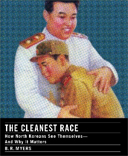 |
The Cleanest Race: How North Koreans See Themselves and Why It Matters, by B. R. Myers What can I say? The tag team of Kim Il Sung and Kim Jong Il — and the impoverished nation they’ve starved nearly to death — are a source of endless fascination to me. Having just finished Bradley Martin’s exhaustively-researched Under the Loving Care of the Fatherly Leader (an 800-page doorstop if ever there was one, reviewed above), I picked up B. R. Myer’s slender book with a sigh of relief. The first of the two books has its shortcomings, most frustratingly in that it only takes the reader up to 2004, before the DPRK tested its first atomic bomb, before the election of a more conservative government in the ROK, before the current hard-line retrenchment and increased isolation of the DPRK that came as a result of that election. This book, written by a college professor living and working in Seoul, picks up where the previous one leaves off. But the two authors come at North Korea and the Kims from different perspectives, and I suspect they would disagree on many points. Martin is a collector and compiler of data; Myers is more comfortable making sweeping generalizations based on his own interpretation of DPRK propaganda. But Myers has a lot to say, even though he says it in fewer words than Martin, and most of what he says seems right on (though who can ever know when it comes to the secretive DPRK?). His main point is that the domestic propaganda to which citizens of the DPRK are constantly exposed (domestic propaganda, that is to say, largely hidden from outside observers) is racist — i.e., the Koreans believe themselves to be the purest of races, and that’s ultimately why it’s so important to hide behind walls and keep the outside world at bay. And the worst enemy of the Korean race, of course, is the American, who is depicted in DPRK propaganda in almost the same way the Jew was depicted in Nazi propaganda. If you’re seriously curious about the Kims and the DPRK, I’d recommend both books. If you’re just a little curious and want to know what’s going on now, I’d recommend Myers’ book. Whether you read both, or just the shorter one (with pictures!), you’ll probably be more afraid of North Korea starting something out of pure desperation than you were before. |
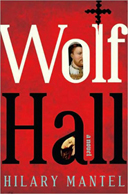 |
Wolf Hall, by Hilary Mantel If the aim of historical novels is to humanize those who came before us, Wolf Hall hits its target. Forbiddingly remote figures like Thomas Cromwell, Thomas More, Henry VIII, and Anne Boelyn become recognizable humans, motivated by the familiar mixture of base desires and elevated impulses we ourselves experience (but mostly, I’m pleased to note, by the former). Hilary Mantel applies a particularly deft and understanding touch to Thomas Cromwell, depicting him as a man ahead of his time, a man who sees and takes advantage of the larger forces that will change feudal England into . . . something else, something beyond even Cromwell’s ability to envision. The squalor of 16th century life is on full display, along with the brutal lengths the Roman Catholic church was prepared to go to to defend its wealth, power, position, and privilege, and Henry VIII is shown to be pretty much the spoiled child you always suspected he was. I love the way Hilary Mantel takes us to the high point of Cromwell’s position and influence in Henry VIII’s court and in parliament, all the while introducing distant discordant notes that herald the forces and enemies that will eventually bring Cromwell down . . . without actually going there. We know what’s coming. Not many historical novels pique my curiosity to the extent of looking up additional information on the characters’ lives and times; this one did. A most rewarding read and a valuable experience. Hilary Mantel earned her Man Booker Prize! |